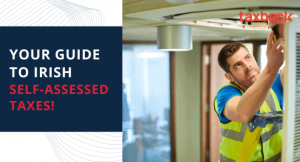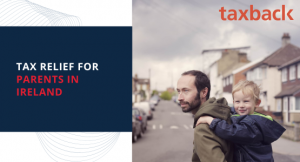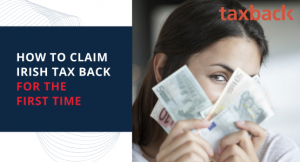Budget 2017 Podcast: Rumours & Predictions-The Rest
What other changes are expected in this year's budget?
In this episode of the budget 2017 podcast, we discuss what changes and proposals, besides tax, are expected in October.
Podcast Transcript
Ciara: Hello and welcome to Taxback.com's Budget 2017 Podcast. Today we're discussing what changes and proposals, besides tax, are expected in October's budget. I'm speaking to our tax experts Barry Flanagan and Christine Keily.
The average Irish tax refund is €1,880
Ciara: Will the government increase the minimum wage?
Christine: I think it is very likely that the minimum wage will be increased, the low pay commission has recommended an increase of 10 cents per hour.
Barry: Yeah the fiscal space again, the wiggle room or extra cash the government has available to it that's gonna be split approx. one third for tax reductions and about two thirds for increased spending so it does give some scope as well for an increase in a few of the social welfare payments and a few reliefs that are available to people, so I think the minimum wage is one of the good news stories that em the government will be looking for from this budget and an increase certainly of at least ten cent would be anticipated.
Ciara: And what's happening with welfare and pensions?
Christine: With regard to welfare and pensions I think we can certainly expect increases in disability benefit and allowance, carer's benefit and allowance. With regards to the state pension and the living alone allowance as well we have heard that Fianna Fáil want an increase of 5 euro per week. I think that's for the living alone allowance and we can certainly expect to see some movement in the area of the Christmas bonus for 2016.
Barry: Yeh I think the Xmas bonus will probably be restored to 100% up from 75% and also I think that em with regard to pensions, its, I think they'll flag to people that the levy that had existed previously is now gone as well so people wont have a previous deduction that they had so that is effectively that costs money because em to take away a charge that you had of course is a cost effectively so that really summarises what we're anticipating in terms of the welfare and pension changes that are coming.
Ciara: What's the Working Family Payment?
Christine: The Working Family Payment is something that has been mooted to be introduced but maybe not until 2018. The Fine Gael manifesto stated this would be a payment to ensure that parents working over 15 hrs per week are paid a minimum wage of 11.75 per hour.
Ciara: What's happening with the Drugs Payment Scheme?
Christine: Well just looking at the Drugs Payment Scheme, and I suppose the way it works at the moment is that each family pays up to certain monthly threshold and drugs over that amount are effectively state funded. There have been suggestions that there would be an annual cap and I suppose what we need to consider is what impact this would have on people with large medical bills.
Ciara: Any plans for the medical card?
Barry: There's a proposal that the entitlement to the medical card would be extended to children who are in receipt of the domiciliary care allowance. so approx 10 thousand children would benefit from that initiative is our understanding. Em certainly I wouldn't expect any reduction in availability of the medical card that had been tried previously and there was a massively adverse reaction to that so I think it is an extension in the availability of the medical card rather than a reduction that would be possible.
Ciara: Will there be any changes in Education?
Christine: I think when we look at third level fees, we may see an increase in fees, there definitely has been talk about that. There was at one point talk of a student loan scheme I think similar to what they have in the UK, this suggestion as I understand went badly so we're not really expecting this to come through.
Barry: And it's also its important, the em, the third level fees are probably going to increase. But it's one of the lesser known tax reliefs is the tax credit for third level fees paid, so this in particular applies to parents who might have more than one child in third level at the same time. The de minimis level; the amount that you have to pay the first three thousand is disregarded so that usually matches the student contribution but if you've got two children in university at the same time then you can potentially have a tax saving there because if you're paying two student contributions that's six thousand which means that the second three thousand can be available for relief at 20% so it's just one of the lesser known tax reliefs and one that people should bear in mind.
I think a lot of the focus of the budget is going to be on increasing front line services; Gardai, nurses, schools, it is going to be an investment in those areas, rather than a huge reduction in tax, so we certainly would expect to see changes in education in terms of changes in investments and payments to teachers, Gardai, nurses; they hopefully will be the people that benefit come October.
Free PDF guide to PAYE taxes in Ireland
Ciara: So how long does it take to apply for a tax refund with Taxback.com?
Christine: Apply for a tax refund at Taxback.com is a very simple and straightforward process, it just takes minutes, you need to have very little information to hand when making the application and in reality once you have your PPS number and access to the internet you can have the application through in a matter of minutes. From there we take the claim forward an it can take up to approx. six weeks for the refund to issue in most cases.
Ciara: That's it for this week's episode of Taxback.com's Budget 2017 podcast. Special thanks to Barry Flanagan and Christine Keily of Taxback.com. I'm Ciara Kennedy.
In the next episode, the budget will be out and we'll be covering all the main changes and how it will affect you.
You'll find all our podcast episodes on our blog at www.taxback.com.




